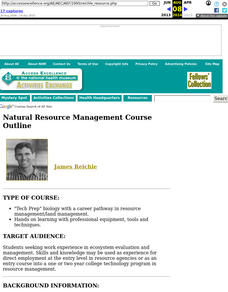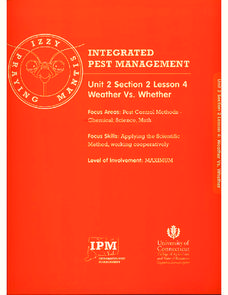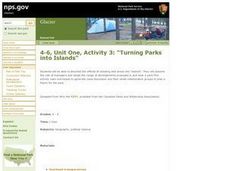College Board
2015 AP® Biology Free-Response Questions
Many future doctors earn college science credit by passing the AP biology test while still in high school. Help young scientists prepare for the exam by studying past test questions. Each of the eight questions covers multiple topics...
College Board
2014 AP® Biology Free-Response Questions
The most popular AP science exam, Biology, also maintains the highest passing rate. The College Board releases old test questions covering trichomes and much more, along with statistics and scoring guidelines to help scholars study for...
College Board
2016 AP® Biology Free-Response Questions
A remarkably high number of scholars passed the AP Biology exam in 2016 with over 61 percent earning college credit. The College Board released the entire free-response section for future scholars to study. After answering the eight...
College Board
2016 AP® Physics 1: Algebra-Based Free-Response Questions
Generally, scholars struggle on the free response portion of the AP Physics 1 exam more than the multiple-choice section. Scholars benefit from additional practice with the help of previous test questions, including questions on forces,...
Curated OER
Watershed Works: Unit 3
Geology whizzes observe the effects of change within a model of a watershed. They place replica waste dumps within the models and note the path that the waste takes as water passes through. This detailed lesson plan provides teacher...
Curated OER
The Effect of Math Anxiety on Cardiovascular Homeostasis
Using a pulse monitor, learners will measure a resting pulse, take a math test, and then measure the pulse again. They analyze the change in pulse and compare it to performance on the test. This multi-purpose lesson can be used in a...
National Wildlife Federation
Ghost Town
Around 93 percent of the reefs on Australia's Great Barrier Reef have been bleached, and almost one quarter of them are now dead. Scholars research the sea temperatures, especially around the areas with coral reefs, to make connections...
Curated OER
Logo Design and Ad Campaign Relating to Forestry Management.
Students explore organizations that promote effective marketing strategies and create their own visual symbols that benefit effective forestry cultivation. In this creative instructional activity students study logos of organizations,...
Curated OER
Forest Management Techniques and Practices
Students study the different forestry techniques and the different harvesting choices. In this forest management lesson students use a map to see the various types of forests and what harvesting practices should be used in the different...
Curated OER
Scientific Methods and Inquiry Skills
Fifth graders conduct a mystery bag experiment and use the scientific method and inquiry skills to solve the mystery. They discuss how to make scientific "guesses," and in small groups use their five senses to try and figure out what...
Curated OER
Natural Resource Management Course Outline
Gain skills in ecosystem evaluation including chemical, biological, and physical qualities. Learners write a report on a local ecosystem.
American Forest Foundation
Who Speaks for the Trees?
Help young conservationists appreciate the important role that trees play in ecosystems around the world with this collection of six engaging activities. From a shared reading and class discussion of Dr. Seuss' The Lorax, to in an depth...
PBS
Stories of Painkiller Addiction: Contemplating Nature vs. Nurture
Does having an addict in your family make it more likely to become one yourself? Explore the genetic risk factors, as well as the prominent environmental influences, for substance addiction in a instructional activity that encourages...
University of Connecticut
Weather Vs. Whether
Monarch butterfly populations have decreased by 90 percent over the past 20 years due to misuse and ineffectiveness of some pesticides. Given the challenge to increase pesticide safety and effectiveness, the class, through discussion,...
Curated OER
Introduce a Weather Unit
Engage your learners by playing Water Music Suite by Handel. Different types of weather sounds play on the recording, and it's an easy lead into talking about the weather! What is weather? What kinds of weather exist? What is it called...
Curated OER
Holidays: Stress on the Body
Students read an article on stress and holiday weight gain. In this biology lesson, students research about the body's response to excess sugar in the diet. They create a pamphlet, billboard, newscast or journal article containing...
Rainforest Alliance
Forests of Guatemala
With 90 percent of its land area covered in forests, Suriname, a country in South America, contains the largest percentage of forests throughout the world. Here is an activity that brings classmates together to learn about the...
National Wildlife Federation
Hot, Hotter, Hottest: Extreme Weather's Impact on Our Resources
How dry is it? It's so dry, the river only runs twice a week! Through an analysis of maps and discussions, pairs learn about droughts across the United States in the ninth of 12 lessons. They then read about, answer questions, analyze...
Center for Learning in Action
Water—Changing States (Part 1)
Here is part one of a two-part lesson in which scholars investigate the changing states of water—liquid, solid, and gas. With grand conversation and up to three demonstrations, learners make predictions about what they think will happen...
Chicago Botanic Garden
Are You Bigfoot?
Scholars independently explore several websites to calculate their ecological footprint. Using their new found knowledge, they answer six short-answer questions and take part in a grand conversation with their peers about how our...
Curated OER
Turning Parks into Islands
Students discuss the effects of isolating areas in a park to make "islands" for nature. In this nature lesson, students role play park rangers who are developing a new section of the park. Students work in groups to plan a park, after...
Curated OER
A Yen for Maximum Residue Limits in Food
Future public health officials or agriculturists read an article and answer questions concerning the Japanese regulations for pesticide exposure. They compare the maximum residue limit for two, 4-D of Japan with other countries. This is...
Curated OER
One + One=One
Students discover that learning can be fun. Problem solving skills are developed through various writing skills. Empower students with personal concept development and time management. Document growth and success of the learner....
Curated OER
Management of Commercial Fisheries
Pupils examine the differences between renewable and nonrenewable resources and study about past fisheries. In this fishery instructional activity students explore the complexity of a fishery and its management.

























